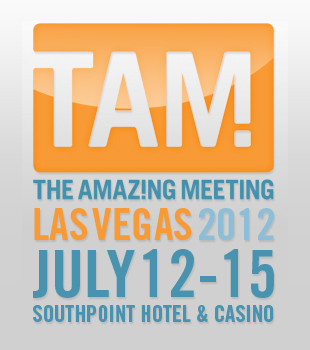Skeptical Africa: Witchcraft and African Development
- Details
- Written by Leo Igwe, JREF Research Fellow
- Category: Swift
- Hits: 17772
Read more: Skeptical Africa: Witchcraft and African Development
New Videos from The Amaz!ng Meeting 2012: Paranormal Investigation and Sean Faircloth
- Details
- Written by JREF Staff
- Category: Latest JREF News
- Hits: 5117
If you missed The Amaz!ng Meeting 2012, you can still catch great talks, panels, and workshops on science and skepticism given live at TAM 2012 on our YouTube page. Today, we are happy to share two more inspiring presentations.
"How Not to be a Paranormal Investigator"
Join James Randi, Banachek, Benjamin Radford, and Matthew Baxter for this panel discussion on the right and wrong ways to investigate paranormal activity, moderated by the JREF's Director of Communications Carrie Poppy.
Sean Faircloth - "Beware the Religio-Industrial Complex"
Sean Faircloth of the Richard Dawkins Foundation for Reason and Science warns against the dangers of faith-based decision making in the public sphere.

See more TAM 2012 videos here.
Inoculated Against Illusion: Skeptics and Face-Pareidolia
- Details
- Written by Kyle Hill
- Category: Swift
- Hits: 18199
When we can’t gauge the intentions and emotions of others, frustration reigns. The invention of text messaging surely has ruined many relationships because the communication is bereft of the facial and tonal cues critical to understanding. (What does “OK” mean? Is he mad at me? Was he being sarcastic?)
Read more: Inoculated Against Illusion: Skeptics and Face-Pareidolia
Teaching the Philosophy of (Pseudo) Science
- Details
- Written by Sebastian Normandin
- Category: Swift
- Hits: 14749
The following is a contribution to the JREF’s ongoing blog series on skepticism and education. If you are an educator and would like to contribute to this series, please contact This email address is being protected from spambots. You need JavaScript enabled to view it..
“What is science?”
I put this question to freshmen in a science college at a Tier-one research university hoping for some creative comebacks in the form of a paragraph or two. I got confusion. Science, apparently, is: everything, nature, technology, “the scientific method,” and, brilliantly, what scientists do. Faced with a barrage of odd, confused generalities, I was dismayed but not surprised. For what is science? It may be among the most elusive questions in the modern world, motivating scholars in history and philosophy of science to write and reflect endlessly. Though this simple question remains foundational to these fields, most thinkers abandon it at a certain point and move on to more concrete, pragmatic concerns. But the question remains.
One way to develop a satisfactory answer is to turn the question around – “What isn’t science?” This was to be my approach teaching an introduction to history and philosophy of science. I would use the concept of pseudoscience to help these budding scientists better understand what it is they think they are getting into. It’s logical. After all, how can one know light without darkness, life without death, love without hate, good without evil? And pseudoscience has such pejorative connotations it’s often seen as dark, even evil, or at least insidious. Value judgments aside, exploring this concept would be a way to draw my audience in and, without them noticing, teach some fundamental principles in history, philosophy and sociology of science.
Unidentified Flying Obscurity
- Details
- Written by Brian Thompson
- Category: Swift
- Hits: 11185
As reported in Britain’s The Telegraph this week, a number of organizations devoted to investigating unidentified flying objects are either disbanding completely or turning their attention to other paranormal pursuits. Said Dave Wood of the Association for the Scientific Study of Anomalous Phenomena: “It is certainly a possibility that in ten years time, [UFOs] will be a dead subject.”
Once, I was a true believer that extraterrestrials were visiting our planet. Compared to, say, believing that leprechauns are hoarding their gold at the end of a rainbow, alien visitation is downright plausible. Mathematically speaking, there’s a good chance other worlds speckled throughout the universe have incubated intelligent life. Maybe some of those worlds have dodged asteroids long enough for their inhabitants to become technologically capable of traveling between the stars. Maybe that’s a Star Trek fantasy, but it’s far less fantastical than another Star Trek notion: that the primary fashion of all Milky Way species is some variation of a polyester jumpsuit.
Page 93 of 408